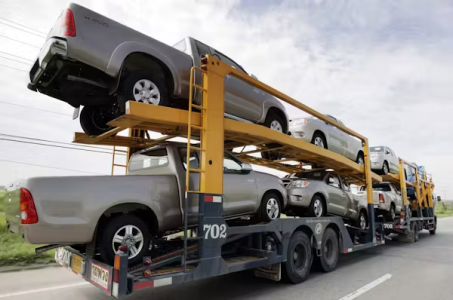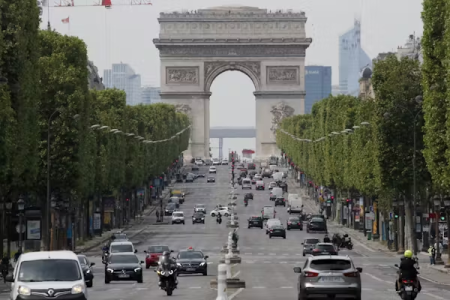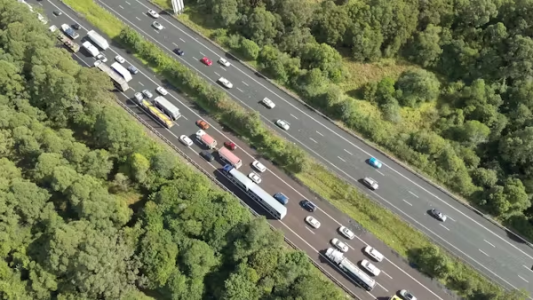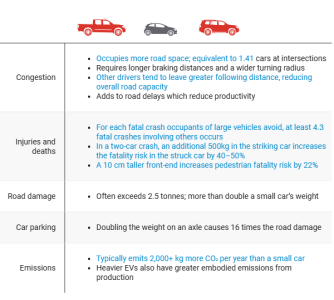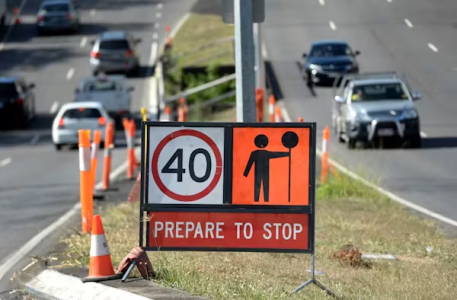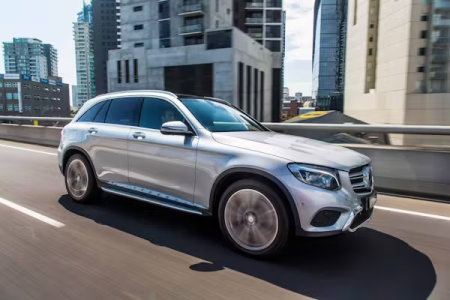Drivers of SUVs and pick-ups should pay more to be on our roads. Here’s how to make the system fairer
- Replies 67
In the year 2000, almost 70% of all new cars sold in Australia were small passenger vehicles – mainly sedans and hatchbacks. But over 25 years, their share has dropped dramatically to just 17%, as a car “size race” took hold.
Now, SUVs and light commercial vehicles comprise almost 80% of the market. Four in five new vehicles sold in Australia today are an SUV, ute, van or light truck.
As larger vehicles become the new norm, they bring more road wear, urban congestion and demands on infrastructure such as parking.
It’s time to ask: should drivers of larger vehicles pay for the damage and disruption they cause, through higher registration charges? Generally, yes. Bigger cars mean bigger costs for everyone else. It’s only fair those costs are reflected in how we price their use of public roads.
Reasons for going big
There are several reasons for the shift to larger passenger vehicles in Australia. They include perceptions that bigger cars are safer and more prestigious, as well as lifestyle preferences.
A loophole in the luxury car tax also encourages car buyers to go big. The tax was introduced on imports in 2000 and this financial year applies to vehicles worth more than A$80,576.
Many utes and SUVs are exempt because they’re classified as light commercial vehicles. The exemption applies regardless of whether the car is used privately or for business.
New vehicle sales since 1995-96
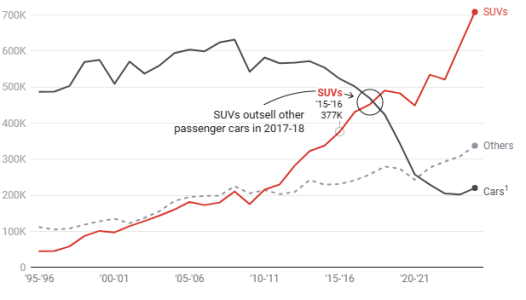
Counting the costs on our roads
Larger vehicles – no matter how they are powered – generally impose bigger costs on society than smaller cars.
Large SUVs and utes (if powered by fossil fuels) have a far greater climate impact. On average, a small car emits 2,040 kilograms less carbon dioxide (CO₂) a year than a pickup truck.
But even big electric vehicles can cause climate harm. The substantial resources required to manufacture a large EV creates emissions, which may undermine the climate benefits electrification promises.
Large passenger vehicles also create health system costs. In road crashes, for example, they may better protect their occupants, but pose greater risks to others – especially pedestrians and those in smaller vehicles.
Research suggests for each fatal crash that occupants of large vehicles avoid, at least 4.3 fatal crashes involving others occur.
Bigger vehicles also need more space. Standards Australia has proposed making car-parking spaces larger to accommodate the trend to larger cars. Cities such as Paris have introduced higher parking fees for SUVs on these grounds.
Larger vehicles also slow overall traffic flow. For example, they have longer braking distances and other motorists tend to drive further behind them than smaller cars.
And at signalised intersections, a large SUV’s impact on traffic flows is equal to 1.41 passenger cars.
In real-world terms, these differences add up. In the United States in 2011, the annual cost of light-duty trucks on congestion and lost productivity was estimated at more than US$2 billion.
Then there’s the cost of road wear. You might think heavier vehicles just wear roads a bit faster than smaller ones. But in reality, the relationship is far more dramatic.
Let’s compare a vehicle with an axle weight of 500 kg and a vehicle with an axle weight of 1,000 kg. The second vehicle doesn’t produce double the road damage – it produces 16 times the damage. This phenomenon is known as the “fourth power rule”.
It means heavier vehicles cost far more in road maintenance. Curious to test it? The Road Damage Calculator lets you compare the relative impact of vehicles of different weights.
How do larger trucks and SUVs stack up against small cars?
What does car rego pay for?
Vehicle registration offers a way to recoup the societal costs caused by large vehicles.
Part of car registration fees go toward administration, but they also help governments pay for the broader cost of vehicles on public infrastructure and shared spaces.
In Australia, car registration systems vary widely between states. Not all reflect the impact of the vehicles on the road.
In Victoria, fees are based mostly on location – whether the car is registered in a metropolitan, outer-metro or rural area. In the Australian Capital Territory, fees are calculated on a vehicle’s emissions.
Queensland and Tasmania use the number of engine cylinders to set fees – a rough proxy for vehicle size, but not a precise one.
In New South Wales and Western Australia, heavier vehicles pay more.
South Australia and the Northern Territory apply different models again, using a combination of settings not directly based on weight.
A fairer system
Larger vehicles take up more road space, contribute more to congestion, and cause exponentially more damage to road surfaces. These are exactly the kinds of impacts a vehicle registration system should help account for.
So, what would a truly equitable registration fee model look like? Based on the evidence, it would not only account for vehicle size and weight, but also how often the vehicle is driven. After all, a heavy car parked in a garage all year causes less impact than one on the road every day.
Several countries, including New Zealand, have adopted distance-based or road-use charging schemes for certain types of vehicles, which uses a combination of vehicle weight and distance travelled.
As our vehicle fleet continues to evolve, Australia should follow suit, with a smarter and more equitable registration fee system.
This article is republished from The Conversation under a Creative Commons license. Read the original article.
Now, SUVs and light commercial vehicles comprise almost 80% of the market. Four in five new vehicles sold in Australia today are an SUV, ute, van or light truck.
As larger vehicles become the new norm, they bring more road wear, urban congestion and demands on infrastructure such as parking.
It’s time to ask: should drivers of larger vehicles pay for the damage and disruption they cause, through higher registration charges? Generally, yes. Bigger cars mean bigger costs for everyone else. It’s only fair those costs are reflected in how we price their use of public roads.
Reasons for going big
There are several reasons for the shift to larger passenger vehicles in Australia. They include perceptions that bigger cars are safer and more prestigious, as well as lifestyle preferences.
A loophole in the luxury car tax also encourages car buyers to go big. The tax was introduced on imports in 2000 and this financial year applies to vehicles worth more than A$80,576.
Many utes and SUVs are exempt because they’re classified as light commercial vehicles. The exemption applies regardless of whether the car is used privately or for business.
New vehicle sales since 1995-96

Source: Bureau of Infrastructure and Transport Research Economics 2024 Yearbook. Created with Datawrapper.
Counting the costs on our roads
Larger vehicles – no matter how they are powered – generally impose bigger costs on society than smaller cars.
Large SUVs and utes (if powered by fossil fuels) have a far greater climate impact. On average, a small car emits 2,040 kilograms less carbon dioxide (CO₂) a year than a pickup truck.
But even big electric vehicles can cause climate harm. The substantial resources required to manufacture a large EV creates emissions, which may undermine the climate benefits electrification promises.
Large passenger vehicles also create health system costs. In road crashes, for example, they may better protect their occupants, but pose greater risks to others – especially pedestrians and those in smaller vehicles.
Research suggests for each fatal crash that occupants of large vehicles avoid, at least 4.3 fatal crashes involving others occur.
Bigger vehicles also need more space. Standards Australia has proposed making car-parking spaces larger to accommodate the trend to larger cars. Cities such as Paris have introduced higher parking fees for SUVs on these grounds.
Larger vehicles also slow overall traffic flow. For example, they have longer braking distances and other motorists tend to drive further behind them than smaller cars.
And at signalised intersections, a large SUV’s impact on traffic flows is equal to 1.41 passenger cars.
In real-world terms, these differences add up. In the United States in 2011, the annual cost of light-duty trucks on congestion and lost productivity was estimated at more than US$2 billion.
Then there’s the cost of road wear. You might think heavier vehicles just wear roads a bit faster than smaller ones. But in reality, the relationship is far more dramatic.
Let’s compare a vehicle with an axle weight of 500 kg and a vehicle with an axle weight of 1,000 kg. The second vehicle doesn’t produce double the road damage – it produces 16 times the damage. This phenomenon is known as the “fourth power rule”.
It means heavier vehicles cost far more in road maintenance. Curious to test it? The Road Damage Calculator lets you compare the relative impact of vehicles of different weights.
How do larger trucks and SUVs stack up against small cars?
What does car rego pay for?
Vehicle registration offers a way to recoup the societal costs caused by large vehicles.
Part of car registration fees go toward administration, but they also help governments pay for the broader cost of vehicles on public infrastructure and shared spaces.
In Australia, car registration systems vary widely between states. Not all reflect the impact of the vehicles on the road.
In Victoria, fees are based mostly on location – whether the car is registered in a metropolitan, outer-metro or rural area. In the Australian Capital Territory, fees are calculated on a vehicle’s emissions.
Queensland and Tasmania use the number of engine cylinders to set fees – a rough proxy for vehicle size, but not a precise one.
In New South Wales and Western Australia, heavier vehicles pay more.
South Australia and the Northern Territory apply different models again, using a combination of settings not directly based on weight.
A fairer system
Larger vehicles take up more road space, contribute more to congestion, and cause exponentially more damage to road surfaces. These are exactly the kinds of impacts a vehicle registration system should help account for.
So, what would a truly equitable registration fee model look like? Based on the evidence, it would not only account for vehicle size and weight, but also how often the vehicle is driven. After all, a heavy car parked in a garage all year causes less impact than one on the road every day.
Several countries, including New Zealand, have adopted distance-based or road-use charging schemes for certain types of vehicles, which uses a combination of vehicle weight and distance travelled.
As our vehicle fleet continues to evolve, Australia should follow suit, with a smarter and more equitable registration fee system.
This article is republished from The Conversation under a Creative Commons license. Read the original article.

